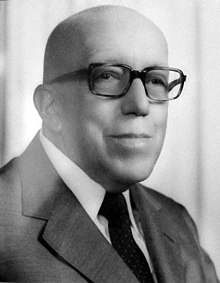José de Magalhães Pinto
José de Magalhães Pinto (born July 28, 1909 in Santo Antônio do Monte , Minas Gerais ; † March 6, 1996 in Rio de Janeiro ) was a Brazilian politician who, among other things, was governor of the state of Minas Gerais between 1961 and 1966 , from 1967 to 1969 Minister of Foreign Affairs, and from 1975 to 1977 president of the Federal Senate (Senado Federal) was.
Life
Deputy and Governor of Minas Gerais
After attending school, Pinto initially worked as an employee at the Banco do Estado de Minas Gerais and later studied law at the Universidade Federal de Minas Gerais , after which he was employed at the Banco Nacional .
He began his political career in 1946 when he was a candidate for the União Democrática Nacional (UDN) and was elected to the Chamber of Deputies (Câmara dos Deputados) , the lower house of the National Congress (Congresso Nacional) . In this he represented the interests of the state of Minas Gerais until 1961.
In 1961, Pinto succeeded José Francisco Bias Fortes as governor of Minas Gerais and held this office until he was succeeded by Israel Pinheiro in 1966. When, on December 30, 1962, the Minas Gerais State Law No. 2764 passed an administrative reform that resulted in the creation of of 237 new parishes, including Ipatinga , provided, the founding of Ipatinga and Timóteo was prevented by him with a veto. In relation to the commission for the acquisition of self-government of the municipalities of the Vale do Aço , he justified this decision with the fact that he wanted to maintain the political, administrative, economic and financial unity of the steel region of the Vale do Aço. During this time he joined the Aliança Renovadora Nacional (ARENA) founded in 1965 . The Estádio Governador Magalhães Pinto in Belo Horizonte , which opened on September 5, 1965, was named in his honor.
For this he was re-elected as a member of the Chamber of Deputies in 1967 and this time represented Minas Gerais until 1971.
Foreign Minister and Senate President
Shortly afterwards, President Artur da Costa e Silva appointed Juracy Magalhães as Foreign Minister (Ministro das Relações Exteriores) in his government, who was a member until the end of Costa e Silva's term in 1969. During his tenure, Brazil took up diplomatic relations with the Democratic Republic of the Congo on June 21, 1968 . On June 27, 1968, the Faculty of Economics at the University of Porto awarded him an honorary doctorate in economics . His successor as foreign minister was Mário Gibson Alves Barboza , the previous ambassador to the USA .
After leaving the Chamber of Deputies, Pinto became a senator in 1971 and was a member of the Senate during the military regime from the 44th to the end of the 45th legislative period in 1979 as a representative of Minas Gerais. During this time he succeeded Paulo Francisco Torres as President of the Senate in 1975 and held this office until he was replaced by Petrônio Portella .
After leaving the Senate, Pinto was re-elected to the Chamber of Deputies for Minas Gerais in 1979 and was a member of it until 1987. There he initially represented the ARENA again before he joined the Partido Democrático Social (PDS) that resulted from it in 1980 .
Web links
- Entry in rulers.org
Individual evidence
- ↑ Instituto Brasileiro de Geografia e Estatística : Enciclopédia dos municípios brasileiros - Volume XXIV (PDF; 8 kB) , Rio de Janeiro 2007, page accessed on May 23, 2010.
| personal data | |
|---|---|
| SURNAME | Pinto, José de Magalhães |
| BRIEF DESCRIPTION | Brazilian politician |
| DATE OF BIRTH | July 28, 1909 |
| PLACE OF BIRTH | Santo Antônio do Monte , Minas Gerais |
| DATE OF DEATH | March 6, 1996 |
| Place of death | Rio de Janeiro |
